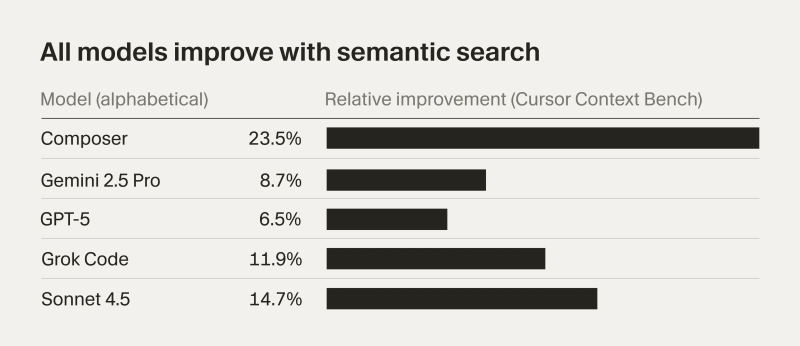● Jeff Huber recently highlighted some interesting research on Twitter, pointing out that someone finally did the hard work of testing how code-retrieval embeddings actually perform in real-world scenarios. According to Huber, the results show users need fewer tries to get the right answer when using this approach.

● The Cursor team backed this up with their own findings, explaining that semantic search makes their AI agent significantly more accurate across all major models, particularly when dealing with large codebases where traditional grep searches just don't cut it. Their benchmark numbers are pretty impressive: Composer saw a 23.5% accuracy boost, Sonnet 4.5 improved by 14.7%, Grok Code gained 11.9%, Gemini 2.5 Pro went up 8.7%, and even GPT-5 showed a 6.5% improvement.
● This technical progress is happening against a tense backdrop in the crypto mining world. Mining companies are pushing back hard against proposed tax reforms, warning that the combination of tighter regulations and already-thin profit margins could push some operations into bankruptcy. They're particularly worried about losing skilled engineers who might leave for more favorable markets if the new tax rules go through without modifications.
● Industry voices argue there's a better approach: rather than slapping on new extraction-based taxes, they're proposing a smaller increase to profit taxes instead. Their reasoning is that this would prevent bigger budget problems down the road—namely, shrinking payrolls that would reduce personal income tax collections and lower overall corporate tax revenue.
● The situation gets more complicated when you factor in additional regulatory changes affecting electricity metering, facility classifications, and reporting requirements. Mining companies say these changes pile on even more financial pressure, making it harder to invest in productivity tools like the improved AI systems Huber and Cursor are discussing.
● As he mentioned in his tweet, he's eager to see data on how much faster these new systems actually work. The Cursor team noted that organizations can now dig into their results and learn how they trained their embedding model specifically for code retrieval. It's a genuine step forward for developer tools, though it probably won't be enough to offset the financial hit if the proposed tax policies move forward unchanged.
 Usman Salis
Usman Salis

 Usman Salis
Usman Salis


